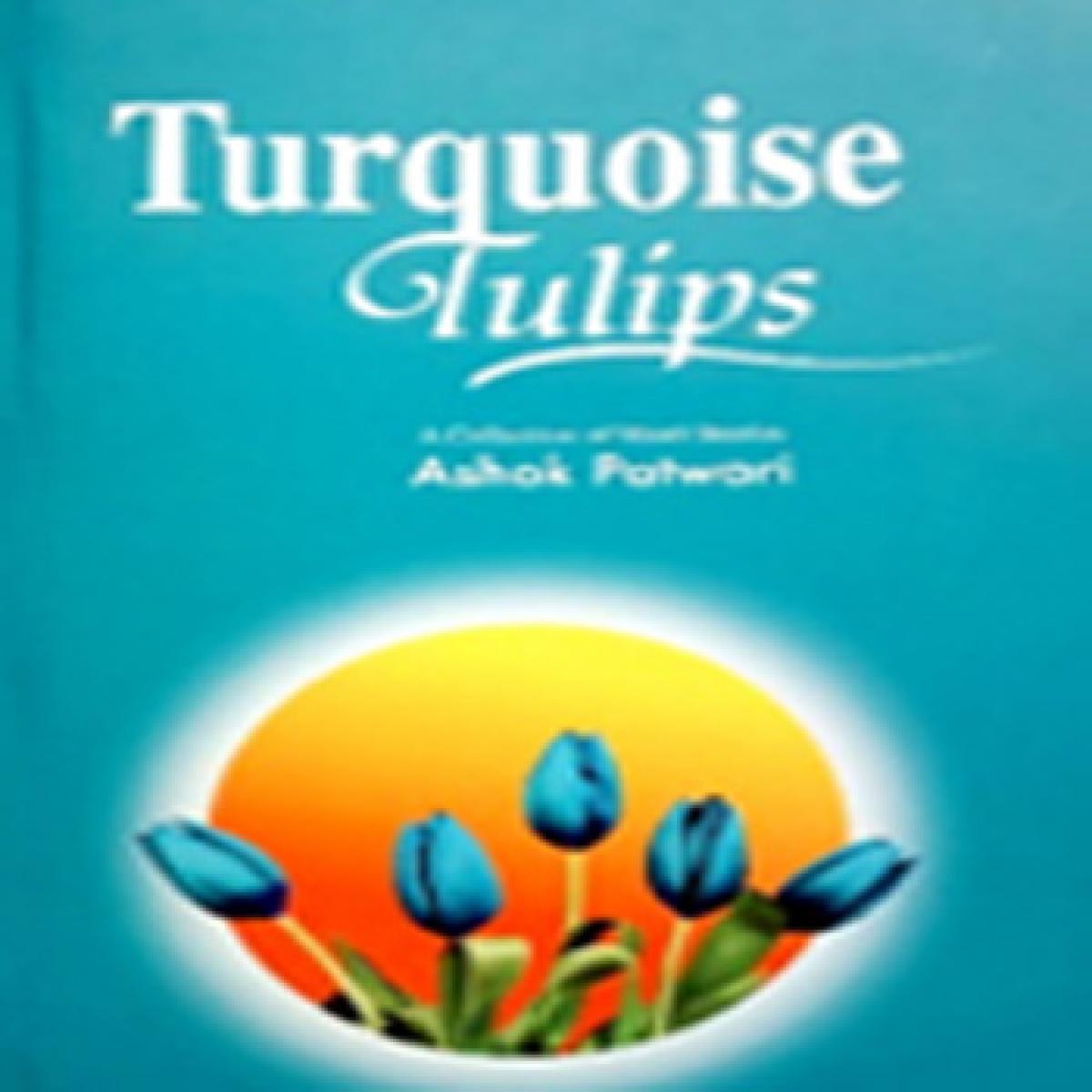Live
- Handloom Market Celebrates 10 Yrs
- IHM Hyderabad Hosts Spectacular Christmas Gala
- An Evening of Ethnic Elegance: Taruni’s Exclusive Fashion Showcase
- Style Banarasi with these 5 modern twist this wedding season
- Akansha flaunts seductive look
- Ajith requests fans to drop ‘Kadavuley’ tag, prefers simplicity
- ‘Pushpa 2’ BTS: Rashmika’s transformation as Srivalli
- Sreeleela inaugurates South India Shopping Mall at Ongole
- Nuveksha steals the spotlight
- Rana’s wife Miheeka take social media by storm
Just In

With ‘Turquoise Tulips’, a collection of twenty-four short stories being out, Dr Ashok Patwari, the US-based medical doctor-cum-writer has secured his place among memorable short story writers of the first order with perfection in their craft and style. Each incident built into the main theme contributes to the structural strength and grace and symmetrical pattern of the story.
An eclectic mix of stories with a truly universal and syncretic ethos, with human values projected at their pristine best in settings both Indian and exotic; from the pen of US-based Ashok Patwari
With ‘Turquoise Tulips’, a collection of twenty-four short stories being out, Dr Ashok Patwari, the US-based medical doctor-cum-writer has secured his place among memorable short story writers of the first order with perfection in their craft and style. Each incident built into the main theme contributes to the structural strength and grace and symmetrical pattern of the story.
There will be sudden and unexpected events and happenings but they are convincingly natural, intelligible and acceptable. To illustrate, the death of Father John by gunshot by one of his own ardent disciples (‘Bridges, not Barriers!’). A few stories may sound like an intellectual disquisition but out of it slowly emerges a fascinating story. His creative fancy is pleasingly harmonised with his critical analysis and this blend goes into his characterisation.
Patwari’s themes don’t have complicated or puzzling labyrinths of plots and subplots. More often than not, his narration or delineation is focussed on, and built around, a single theme. As he builds the background base for the story, the needed atmosphere begins enveloping the scene. The author connects the past and present with an incident or a remembrance of a past experience and weaves it into his story, retaining thus the continuum in his creative flow and process.
His creative imagination, which is profuse, is very well under control by a regulating intellect and thus it expresses itself in right verbal harmony. It is amazing that Patwari handles his stories on diverse themes with equal ease. We wonder as to how he could have such amazing mastery of thematic detail. Further, he has negative capability – an ability to draw a character and to be possessed with its psychology and sensibility.
Some of his stories begin in a rather plain way, but as they move on, they acquire a great momentum and the reader’s attention is sucked in powerfully. And in stories like ‘The Dream House’ he builds up an intense imaginative curiosity right from the beginning. Each story has its own charm.
In characterisation, Patwari doesn’t yield to romantic fancy. He doesn’t attempt to draw characters of heroic stature larger than life size far removed in space and time. We find in it a convincing realism mixed with a measure of practical and practicable idealism. Generally speaking, we don’t find villains in them, and if we do, we find that Patwari’s focus is not on them. He is instinctively drawn to drawing ordinary men and women who in spite of their frailties and foibles have a streak of native nobility in them.
Patwari is as skilful at dialogue writing as at narration. Skilfully written dialogues have a special merit in that they facilitate an optimal direct contact between the reader and the character, without the writer being an interpreter but only a creator.
With wonderful storytelling skills Patwari can weave one out of almost nothing as in ‘The Savior’, which is a hymn to human endeavour, tenacity, tremendous willpower, improvising intelligence and presence of mind.
The angelic advice (‘Bridges, not Barriers!’), Sudhakar’s genuine charity and compassion (‘Lord, Forgive My Friend!’), the poor woman’s sacrifice of her dream house in hand for the sake of her loved ones (‘The Dream House’), the rhythm in reverse
(‘The Native’), the divine forgiveness (‘Vendetta’), the transformation of a rationalist’s arrogance into the humility of a supplicatory in distress (‘Swami Ji’), and a mother’s all-out effort to keep alive a hope for life in her dying child afflicted with cancer in the title story ‘Turquoise Tulips’ are deeply touching and highly ennobling.
The author’s style is racy, fluent, elegant and engaging; sometimes transcending the beauty of prose into more and more colourful realms of poetry.
He has no vain fascination for words as he doesn’t strive for effect, but effect follows on tiptoe. Reading his stories will be an uplifting experience and cause a feeling that man, after all, is great even in his imperfect world. Patwari’s stories rouse in us a zest and respect for life and raise in us a hope for humankind.

© 2024 Hyderabad Media House Limited/The Hans India. All rights reserved. Powered by hocalwire.com







